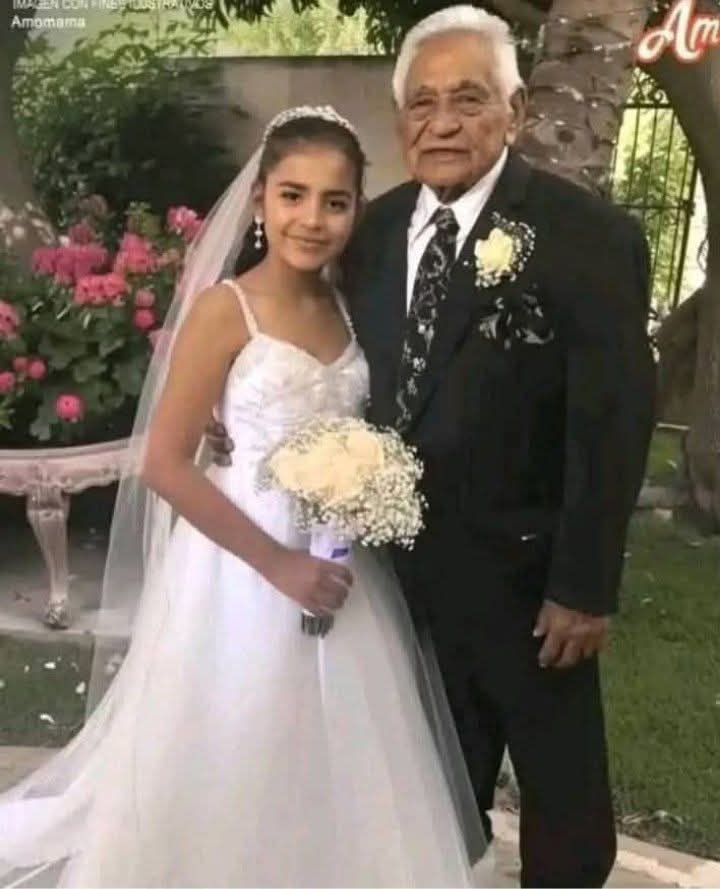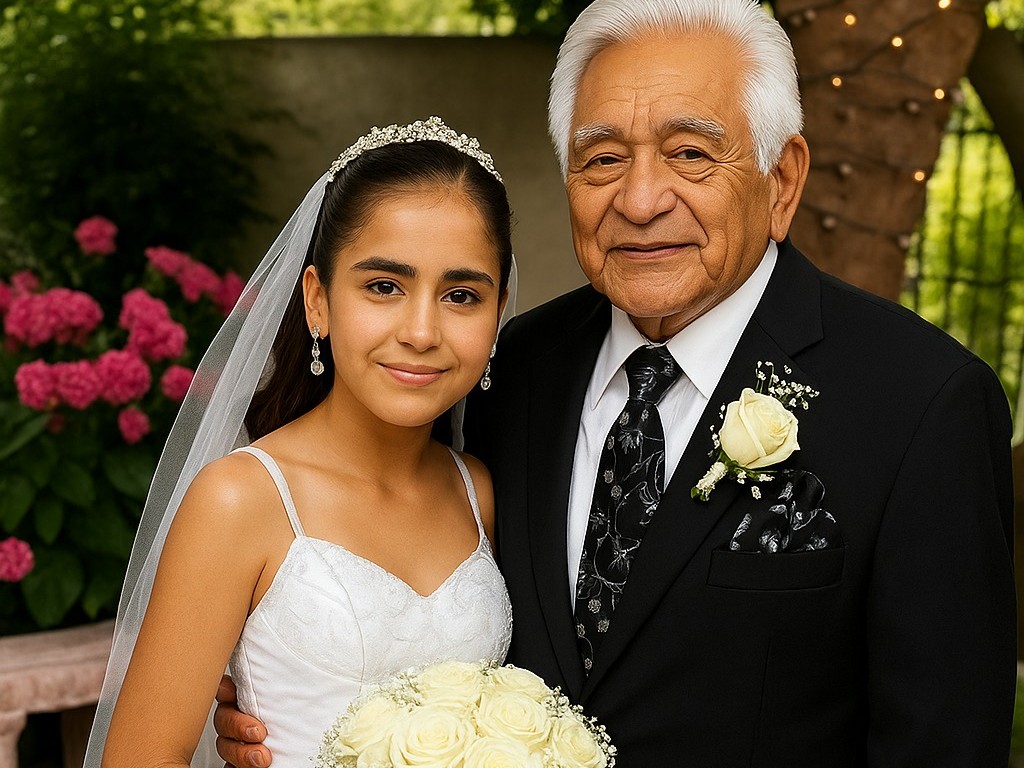In a quiet village nestled between dry hills and whispering trees, lived a twelve-year-old girl named Liana. Her days were simple, marked by dust-covered roads and the bittersweet scent of oranges. Every morning, barefoot and determined, she walked to the crowded town square, carrying a woven basket filled with fruit. She wasn’t just selling oranges—she was fighting time. Her younger brother, Tomas, had fallen seriously ill, and her family could barely afford food, let alone medicine.
Liana’s parents were kind but desperate. Her mother’s hands were worn from washing clothes for neighbors. Her father limped from an injury sustained years ago during harvest. Poverty had crept in slowly, like the evening fog, until it clouded everything. Each coin Liana earned from her oranges was a glimmer of hope—a small chance to keep her brother’s lungs breathing and his laughter alive.

A Stranger’s Proposal
One afternoon, as the sun hung low and the market began to thin out, an old man approached her stall. His clothes were neat, his beard silver, and his eyes carried a sharpness that unsettled her. He asked about the oranges, then about her family. His voice was calm, measured. When he spoke of Tomas, her heart froze.
“I’ve heard your brother needs medicine,” he said. “I can help.”
Her first instinct was suspicion—how did he know? But he explained he had visited their village before and often helped struggling families. Then came the offer: he would pay for Tomas’s treatment, provide food, and ensure the family never went hungry again.
In return, he asked to take Liana to live with him in the city.
The words hung in the air. There was no talk of marriage, but everyone understood. Her parents hesitated, but desperation spoke louder than fear. That night, Liana cried herself to sleep. At dawn, she hugged her brother tightly, kissed her mother goodbye, and climbed into the man’s cart, not knowing what would follow.
A House of Silence
His home was large, but quiet. The rooms were cold, painted in fading colors of past joy. The staff were kind, though distant. He gave her a room, food, and clothes that didn’t quite fit. Yet despite the size of the house, he rarely spoke. Days passed, and she realized he wanted nothing from her but company. She helped in the garden, read books left on the shelf, and sat across from him during dinner.
He never raised his voice. He never touched her. But he never smiled, either.
Seven days in, Liana grew curious. What was his story? Why had he brought her here?
That night, after dinner, she asked him directly: “Why me?”
The old man stared at her for a long time. Then, softly, he said, “Because I was once saved by a girl like you.”

The Hidden Past
He told her a story—not about riches or romance, but about regret. As a young man, he had grown wealthy through business. But in his hunger for success, he had turned his back on kindness. He pushed away his own sister when she needed help. She had been poor, sick, and in need—just like Tomas. He never forgave himself. Years later, when he tried to find her, she was gone. He built a home, filled it with things, but it remained empty.
“I see her in you,” he said. “The courage. The fire. I brought you here because I couldn’t let the same mistake happen twice.”
Liana sat quietly. She didn’t know what to say.
He reached into a drawer and handed her an envelope. Inside was money—enough for Tomas’s treatment and more. “You can go home if you wish. Or you can stay here and learn. This house is yours, if you want it.”
She was overwhelmed, but not afraid. This wasn’t the story she expected. It wasn’t a fairytale, nor a nightmare. It was something stranger—an encounter between two broken hearts that needed healing.

The Voice Within
Liana stayed. But not forever. She used the old man’s library to study. She wrote letters to Tomas, who grew stronger each day. She began speaking at community centers, telling stories not of sorrow, but of second chances. She didn’t describe herself as a victim. She called herself a witness—of hardship, yes, but also of the power of choosing differently.
The old man eventually passed away, peacefully, with Liana holding his hand. He left her the house, the garden, and a note that read:
“You saved me. Not with your silence, but with your questions.”
Years later, Liana became a teacher, then a writer, then a mentor to girls like her—brave, quiet, and full of unspoken strength. Her story reached beyond borders. Not because it was dramatic, but because it was real.
She never called it a rescue. She called it a return—to herself, to her roots, to what mattered.
The Message: What This Story Means
Liana’s journey isn’t about a secret uncovered in the dark, or a dramatic escape from cruelty. It’s about dignity. It’s about how, in a world that often overlooks the young and poor, one girl found her voice—and used it to lift others.
Many children around the world still face challenges like early marriage, poverty, and limited access to education. But stories like Liana’s remind us that every act of courage—even a question asked at the right moment—can shift the course of a life.
Let us choose to see these children not as broken or helpless, but as full of potential. Let us ask, not “what did they endure?” but “what can we help them become?”
Final Thought
Not every girl gets a second chance. But every girl deserves one.
